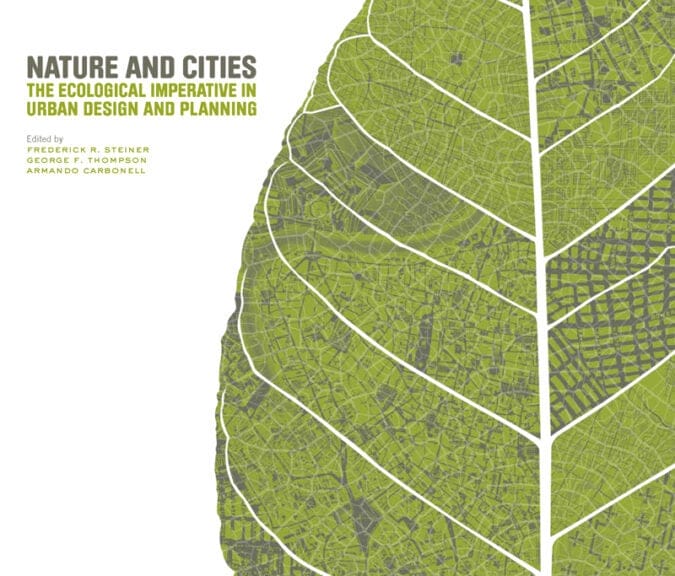Libros

Nature and Cities
The Ecological Imperative in Urban Design and Planning
Edited by Frederick R. Steiner, George F. Thompson, and Armando Carbonell
Noviembre 2016, inglés
Lincoln Institute of Land Policy
“This book overflows with imaginative insights and proposals to guide the ongoing urbanization of our planet.”
— Bruce Babbitt, U.S. Secretary of the Interior, 1993–2001
This illustrated collection of essays by leading international architects, landscape architects, city planners, and urban designers demonstrates the economic, environmental, and public health benefits of integrating nature more fully into cities.
Read an excerpt from the book by the editors of Nature and Cities.
Susannah Drake’s chapter, WPA 2.0: Beauty, Economics, Politics, and the Creation of Twenty-First Century Public Infrastructure, is also available to read in its entirety.
About the Editors
Frederick Steiner serves as the dean and Paley Professor for the University of Pennsylvania School of Design.
George F. Thompson has been a professional editor and publisher since 1984.
Armando Carbonell is vice president of programs at the Lincoln Institute of Land Policy.
Reviews
“The beautiful photographs and lush design of Nature and Cities mask a radical and revolutionary set of ideas from some of the world’s most insightful and intelligent landscape architects and urbanists. Brilliantly curated and edited, these essays offer fresh ideas about how to integrate our understanding of the human condition and the health, vitality, and sustainability of the planet.”
— Darren Walker, President, Ford Foundation
“This important and beautiful book signals an exciting maturation of the linkage between ecological science and the theory and practice of urban design. The essayists, who represent both long-standing pioneers and new leaders in landscape architecture and planning, suture the urban and natural together, based on sound understanding of urban ecology. The integration is illustrated with innovative designs and plans that document the power and ethical need for the ecological turn in metropolitan design.”
— Steward T. A. Pickett, Distinguished Senior Scientist, Cary Institute of Ecosystem Studies
“In their new book, editors Frederick Steiner, FASLA, George Thompson, and Armando Carbonell have made complex ideas about urban ecological design incredibly accessible. They make a convincing argument that ‘ecological literacy’ is an ‘essential base’ for anyone involved in urban planning and design today. There are 17 thought-provoking essays from leading landscape architects and planners from around the world.”
— DIRT Best Books of 2016 (American Society of Landscape Architects)
“This valuable collection of new essays asserts that nature and cities can no longer be posited as diametrically opposed conditions. In this critical moment of rapid global climate change and unprecedented species loss, we are ethically tasked with the creation and stewardship of equitable urban systems and productive urban landscapes that support both human and nonhuman biota.”
— Catherine Seavitt Nordenson, Associate Professor, City College of New York, and Co-author, On the Water: Palisade Bay
“Yes, lightening can strike twice. Expanding on the discourse they ignited almost 20 years ago with Ecological Planning and Design, Thompson and Steiner (joined by Carbonell) have assembled another collection of timely, illuminating, and thought-provoking essays that is essential reading for both students and professionals.”
— Charles A. Birnbaum, FASLA, FAAR, President and CEO, The Cultural Landscape Foundation
“Nature and Cities summarizes all that we have learned about how natural systems shape cities since Ian McHarg’s Design with Nature was published in 1969. It illustrates how design professionals, ecologists, and citizens can strike a new balance between human settlements and nature in designing the cities and regions of the emerging Anthropocene epoch.”
— Robert Yaro, Professor of Practice, University of Pennsylvania, and President Emeritus, Regional Plan Association
“Nature and Cities places ecology at the crosshairs of a rapidly evolving world—not merely as an applied science but as a systemic way of thinking toward building a healthy and resilient future.”
— Ignacio Bunster-Ossa, FASLA, LEED AP, Landscape Architecture Practice Leader (Americas), AECOM
Table of Contents
George F. Thompson, Frederick R. Steiner, and Armando Carbonell
The Landscape Today and the Challenges Ahead
James Corner
The Ecological Imagination: Life in the City and the Public Realm
Richard Weller
The City Is Not an Egg: Western Urbanization in Relation to Changing Conceptions of Nature
Anne Whiston Spirn
The Granite Garden: Where Do We Stand Today?
Charles Waldheim
The Landscape Architect as Urbanist of Our Age
Kongjian Yu
Creating Deep Forms in Urban Nature: The Peasant’s Approach to Urban Design
Elizabeth K. Meyer
Sustaining Beauty: The Performance of Appearance Design
Jose Alminaña and Carol Franklin
Creative Fitting: Toward Designing the City as Nature
Forster Ndubisi
Adaption and Regeneration: A Pathway to New Urban Places
Danilo Palazzo
The Role of Utopia in Ecological Planning and Design
Susannah Drake
WPA 2.0: Beauty, Economics, Politics, and the Creation of Twenty-First Century Public Infrastructure
Timothy Beatley
New Directions in Urban Nature: The Power and Promise of Biophilic Cities and Blue Urbanism
Kate Orff
Gardening the Bay: Participatory Frameworks for Ecological and Economic Change
Nina-Marie E. Lister
Resilience Beyond Rhetoric in Urban Design
Chris Reed
Projective Ecologies in Urban Design and Planning
Kristina Hill
Form Follows Flows: Systems, Design, and the Aesthetic Experience of Ecological Change
Laurie Olin
Water, Nature in Cities, and the Art of Landscape Design
Frederick R. Steiner, George F. Thompson, and Armando Carbonell
Afterword: Prospects for Urban Ecological Design and Planning
Palabras clave
adaptación, mitigación climática, conservación, desarrollo, ecología, medio ambiente, gestión ambiental, recursos naturales, planificación, regionalismo, resiliencia, desarrollo sostenible, urbano, diseño urbano, desarrollo urbano, regeneración urbana, urbanismo, agua
